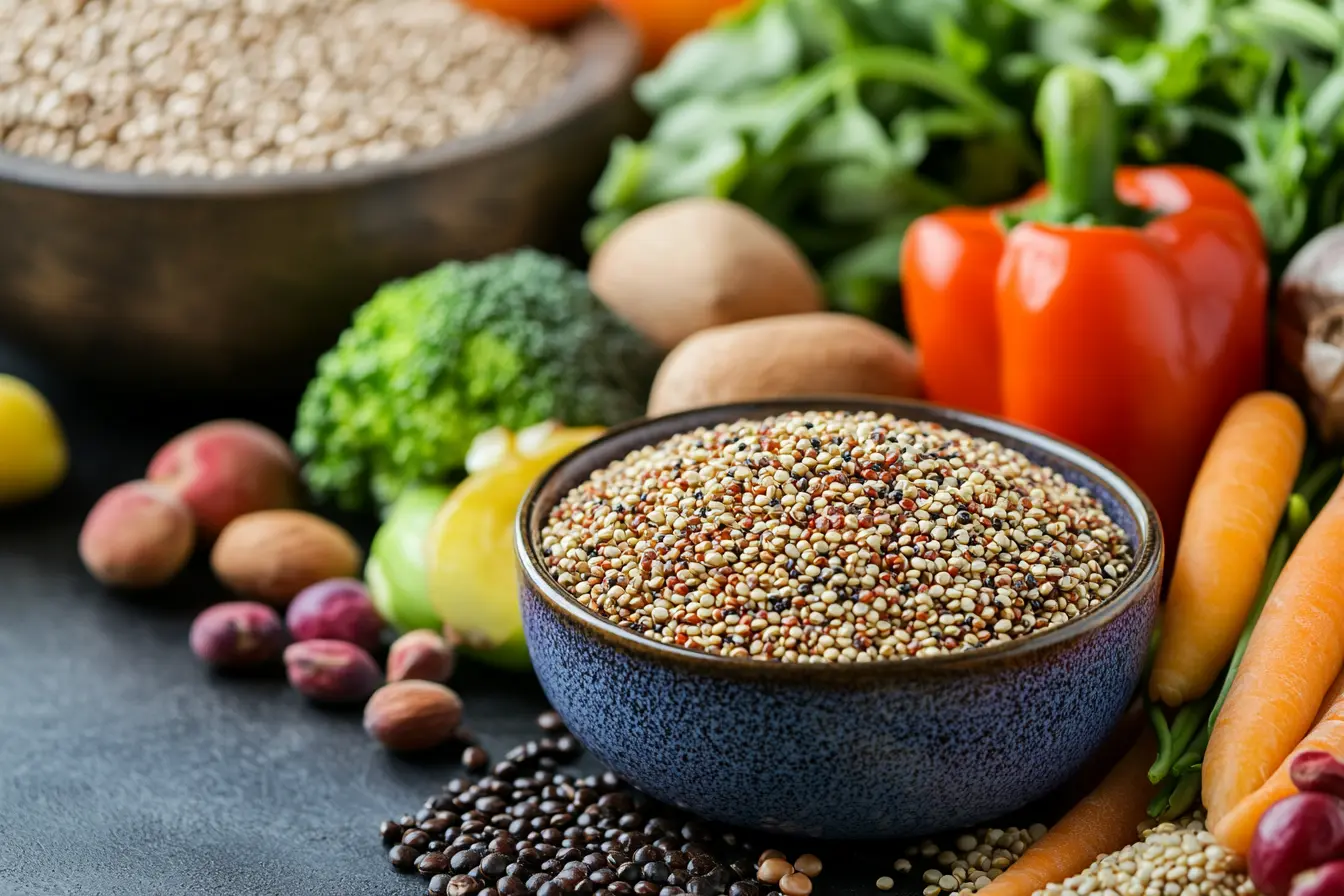Quinoa, often referred to as a superfood, has gained considerable popularity for its wide range of health benefits. One area where quinoa particularly stands out is in promoting digestive health. Many people frequently ask, is quinoa good for bowels? The short answer is yes. Thanks to its high fiber content and anti-inflammatory properties, quinoa can support better bowel health and improve gut function.
In this comprehensive guide, we will explore the answer to is quinoa good for bowels, how quinoa impacts your digestive system, the ways it can alleviate constipation, and how to incorporate it into your diet for maximum gut health. We’ll also address common concerns, such as whether quinoa can cause bloating or digestive discomfort. By the end, you will understand how quinoa plays a significant role in maintaining healthy bowels and promoting overall gut health.
If you’ve ever wondered, is quinoa good for bowels, this guide will clarify how quinoa helps improve bowel function, keeps your digestive system running smoothly, and supports regularity. Stay tuned to learn all the reasons why quinoa is good for bowels and should be a staple in your diet.
What Makes Quinoa Good for Digestive Health?
Quinoa is more than just a trendy grain—it’s a powerhouse of nutrients, many of which contribute to healthy digestion. First and foremost, when asking is quinoa good for bowels, the answer lies in its rich fiber content. This high fiber content is key to maintaining bowel regularity and preventing constipation. Fiber plays a vital role in the digestive process by promoting the movement of food through the intestines and preventing waste buildup, addressing the question of is quinoa good for bowels effectively.
Moreover, quinoa is classified as a whole grain, which means it retains all parts of the grain, including the bran, germ, and endosperm. This makes quinoa a nutrient-dense food that offers more fiber and essential nutrients compared to refined grains like white rice or pasta. According to Harvard’s T.H. Chan School of Public Health, incorporating whole grains like quinoa into your diet can reduce your risk of digestive issues, such as constipation and inflammatory bowel conditions.
But that’s not all. Quinoa is also rich in antioxidants and anti-inflammatory compounds, which can help reduce inflammation in the gut. Inflammation is often linked to poor digestion and bowel disorders, so consuming anti-inflammatory foods like quinoa may help soothe the digestive system. For those curious about how to use quinoa in everyday cooking, Hope Recipes offers simple and flavorful ways to prepare this superfood.
How Fiber in Quinoa Supports Healthy Bowel Movements
One of quinoa’s greatest benefits is its high fiber content. In just one cup of cooked quinoa, you’ll get about 5 grams of fiber, which is crucial for promoting healthy and regular bowel movements. Fiber is essential because it adds bulk to stools, which makes them easier to pass and helps prevent constipation. Additionally, fiber helps regulate the digestive process, ensuring that food moves through the intestines at a steady pace.
There are two main types of fiber: soluble fiber and insoluble fiber, and quinoa contains both. Soluble fiber dissolves in water, forming a gel-like substance that softens stools and slows digestion. This type of fiber can help people who experience diarrhea or irregular stools. Insoluble fiber, on the other hand, adds bulk to stools and promotes the passage of food through the digestive system, which is especially beneficial for those who struggle with constipation.
Furthermore, a diet rich in fiber can improve the overall function of your digestive tract. By ensuring that you consume adequate fiber, you’ll reduce your risk of developing bowel disorders like diverticulitis or hemorrhoids. If you’re looking for ways to increase your fiber intake while maintaining a balanced diet, the Mayo Clinic’s guide offers valuable tips on how to do so with whole foods like quinoa.
Comparing Quinoa to Other Grains for Digestive Health
One question many people have is how quinoa compares to other grains when it comes to digestive health. Quinoa stands out for several reasons. First, it has significantly more fiber than refined grains like white rice or pasta. One cup of white rice has only about 0.6 grams of fiber, while quinoa offers over 5 grams. This makes quinoa a superior choice if you’re trying to boost your fiber intake and support bowel health.
Additionally, quinoa is naturally gluten-free, making it an excellent option for people with gluten sensitivity or celiac disease. Gluten, a protein found in grains like wheat, barley, and rye, can cause digestive issues such as bloating, diarrhea, or abdominal pain in individuals who are intolerant. Quinoa provides a gluten-free alternative that is easier on the digestive system while still providing the benefits of a whole grain.
For those managing digestive issues, quinoa may be more tolerable than other grains like barley or whole wheat, which can be harder to digest due to their higher gluten content. To explore creative ways to include quinoa in meals, visit Hope Recipes for ideas on how to make quinoa a regular part of your diet.
Quinoa and Bowel Health: Common Digestive Issues It May Help With
Can Quinoa Help with Constipation?
Yes, quinoa is particularly effective for individuals who experience constipation due to its fiber content. Insoluble fiber adds bulk to the stool, making it easier for food to pass through the colon. By improving stool bulk and hydration, quinoa can prevent the slow transit of waste that leads to constipation. Furthermore, fiber promotes the growth of beneficial gut bacteria, which also supports healthy digestion and bowel regularity.
To prevent constipation, try incorporating quinoa into your meals several times a week. Whether added to salads, soups, or even breakfast bowls, quinoa can provide the fiber needed to improve regularity.
Is Quinoa Good for IBS (Irritable Bowel Syndrome)?
People with Irritable Bowel Syndrome (IBS) often have difficulty finding foods that won’t trigger their symptoms. Quinoa is often well-tolerated by individuals with IBS because it’s gluten-free, high in fiber, and low in FODMAPs (fermentable carbohydrates that can cause digestive issues for IBS sufferers). FODMAPs are notorious for triggering bloating, gas, and abdominal discomfort in people with IBS, but quinoa is a safe grain to consume without causing these symptoms.
For those with IBS, adding quinoa to your meals can help manage symptoms while providing essential nutrients and fiber. Always make sure to rinse the quinoa thoroughly before cooking to remove the saponins, which can sometimes cause mild digestive discomfort.
Does Quinoa Help with Gut Inflammation?
The anti-inflammatory properties of quinoa make it particularly helpful for individuals dealing with gut inflammation. Conditions like Crohn’s disease, ulcerative colitis, and other inflammatory bowel diseases (IBD) can cause chronic inflammation in the digestive tract, leading to discomfort and disrupted bowel habits.
Quinoa contains anti-inflammatory compounds like quercetin and kaempferol, which may help to reduce this inflammation and soothe the gut lining. By incorporating quinoa into your diet, you’re providing your body with beneficial nutrients that support your overall digestive health.
Can Quinoa Cause Digestive Discomfort?
While quinoa is generally good for digestive health, there are a few potential downsides to be aware of. Quinoa contains saponins, which are naturally occurring compounds that can cause bitterness and, in some cases, mild digestive discomfort. To reduce the risk of discomfort, it’s crucial to rinse quinoa thoroughly before cooking to remove these saponins.
Some individuals may also experience bloating or gas after consuming quinoa, especially if they are not used to a high-fiber diet. If you are increasing your fiber intake with quinoa, start with smaller portions and gradually build up. This will allow your digestive system to adjust to the higher fiber content without causing bloating or discomfort.
Recipe: Lemon Turmeric Quinoa Salad for Gut Health
If you’re looking for a simple yet flavorful way to enjoy quinoa while promoting digestive health, try this Lemon Turmeric Quinoa Salad. Packed with fiber, anti-inflammatory turmeric, and fresh vegetables, this salad is light on the digestive system and full of nutrients.
Ingredients:
- 1 cup quinoa, rinsed well
- 2 cups vegetable broth
- 1 teaspoon ground turmeric
- 1 clove garlic, minced
- 1 tablespoon olive oil
- 1 large lemon, zest and juice
- 1/2 cucumber, diced
- 1/4 cup parsley, chopped
- 1/4 red onion, finely chopped
- Salt and pepper, to taste
Instructions:
- Rinse the quinoa under cold water to remove any bitterness.
- In a saucepan, combine quinoa, vegetable broth, and turmeric. Bring to a boil, then reduce heat and simmer for 15 minutes until the liquid is absorbed.
- Let the quinoa cool, then fluff it with a fork.
- In a small bowl, whisk together the garlic, olive oil, lemon juice, salt, and pepper.
- Toss the quinoa with diced cucumber, red onion, and parsley. Drizzle with the lemon dressing and mix well.
This salad is perfect for a light lunch or as a side dish with grilled chicken or fish. Not only is it packed with digestive-friendly ingredients, but it also offers a delicious flavor that can be enjoyed by the whole family. For more light and healthy quinoa recipes, check out this Cucumber Pepper Salad recipe from Hope Recipes.
FAQs: Quinoa and Bowel Health
Does Quinoa Help with Constipation?
Yes, quinoa’s high fiber content promotes healthy bowel movements and can help prevent constipation by adding bulk to stools and promoting regularity.
Can Quinoa Cause Bloating?
In some cases, consuming too much quinoa too quickly can lead to bloating, especially if your digestive system is not used to high-fiber foods. To avoid this, start with smaller portions and gradually increase your intake.
Is Quinoa Better Than Rice for Digestion?
Quinoa offers more fiber and essential nutrients than white rice, making it a better option for supporting digestion and promoting regular bowel movements.
How Much Quinoa Should I Eat for Digestive Benefits?
It’s recommended to consume about 1/2 to 1 cup of cooked quinoa per serving. Gradually increasing your portion size can help you reap the digestive benefits without overwhelming your system.
Conclusion: Is Quinoa Good for Bowels?
In conclusion, quinoa is an excellent addition to any diet focused on improving digestive health. Its high fiber content helps promote regular bowel movements, while its anti-inflammatory properties can support a healthy gut. Whether you’re managing constipation, IBS, or gut inflammation, quinoa is a versatile food that can easily be incorporated into a wide variety of meals. For more recipe ideas that feature quinoa, be sure to visit Hope Recipes and explore new ways to enjoy this superfood.

